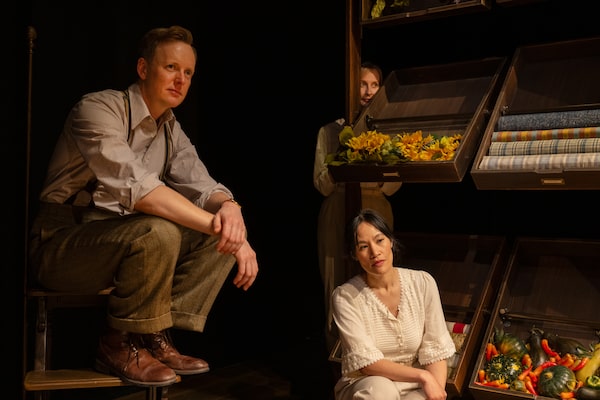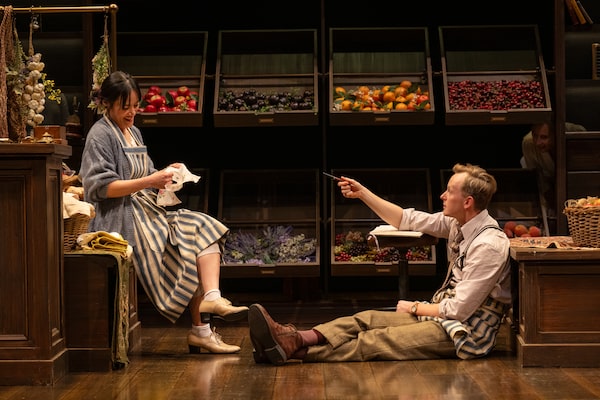
Kyle Blair, Donna Soares and Julia Course in Village Wooing at the Shaw Festival.Handout/Photo by David Cooper/Shaw festival/Supplied
Dice are cast and so are plays. Usually only one of these involves unpredictability.
At the Shaw Festival in Niagara-on-the-Lake, Ont., however, audiences buying a ticket to certain shows are taking a gamble on which actors they are going to be seeing on stage.
To a certain extent, this is true of all theatre – and now more than ever. The pandemic has led to the retirement of the old axiom “the show must go on,” and stars with the sniffles take the day off rather than battling through and risking taking down the whole company if that cold turns out to be COVID-19.
But, in the case of Village Wooing and Mother, Daughter, two Shaw productions helmed by visiting director Selma Dimitrijevic, each performance’s casts are planned in advance and kept secret from ticket-buyers.
All The Globe’s reviews from the 2023 Stratford Festival and Shaw Festival so far
Village Wooing, a 1933 Bernard Shaw shortie now playing at the Royal George, is about a cranky male travel writer and an enthusiastic female shop clerk who meet on a cruise ship; later on, he shows up at the store where she works in a small English village.
It is a romantic comedy – well, as romantic as Shaw ever got. The dynamic between the two characters – a contrarian man of ideas being cornered by an impulsive woman driven by what Shaw called the “Life Force” – is familiar from the Irish playwright’s more substantial works, as are the discussions of the economic and moral merits of marriage (or lack thereof).
In not giving these characters names beyond A and Z, Shaw seems to be positing that there is something universal about them. Dimitrijevic’s production, then, could be seen as a test of A’s hypothesis that “men are all alike” (and that women are as well). Unfortunately, the stage manager is the only one who’s really going to be able to attest to the results of the experiment.
Three male actors have been cast as A (David Adams, Kyle Blair, Michael Man) and three female ones as Z (Julia Course, Keira Sangster, Donna Soares); the audience on any given day will see one of the nine possible combinations of this diverse group of performers. The schedule, though predetermined, is not posted publicly.
None of the actors get the day off, mind you: The ones not playing A or Z wander on stage and watch, moving props with a mysterious air from one place to another on Beyata Hackborn’s handsome set, and occasionally stealing focus by waltzing on their own or making shadows on the wall with the lights.

Donna Soares as Z and Kyle Blair as A in Village Wooing.Handout/Photo by David Cooper/Shaw festival/Supplied
There seems little point assessing the chemistry between the two actors who played A and Z on the day I happened to be there, as you have an 11 per cent chance of seeing it recreated. The general atmosphere, however, was of decent performers still feeling each other out during a rehearsal run. Given the lack of rigour in results, it would be more entertaining for the audience if the pairings were pulled out of a hat at the top of the show – or if we could watch all six actors tap in and out of the characters at will.
I suspect whatever was going on around the leads at the performance I saw – the curtain rose and fell in curious ways and fruit was rolled about on the floor – was mischief-making designed to keep the actors on their toes, but it was like watching people play a game without knowing the rules.
That feeling of being excluded, though less pronounced, extended to Mother, Daughter, a 45-minute play written and directed by Dimitrijevic that is playing in a vintage travelling theatre, or “spiegeltent,” that the Shaw Festival has imported from Belgium and set up outside the Festival Theatre for the summer (and which, alas, has all the charm of a barn during the daytime, with a sparse audience and the bar closed).
This short, sharp show consists of three scenes involving a daughter visiting her difficult mother; in each one, the daughter tries different tactics to get through the same conversation and to the making of tea without a fight.
Why is this interaction so important to get right? Eventually, it becomes clear in a coda. (The play is like a small steeped cup of For the Pleasure of Seeing Her Again by Michel Tremblay without milk or sugar.)
At the performance I attended, Patti Jamieson and Jade Repeta played the mom and the daughter, respectively. Though the simple staging had an almost perfunctory feel in the afternoon light, I enjoyed being able to watch long-time Shaw star Jamieson act up close, and to see how Repeta, who has been a season standout, can fill out a role with small details as well as she does swagger.
At other performances, Shane Carty and Vinnie Alberto are playing the mother and daughter, and that schedule is, as with Village Wooing, predetermined but not posted publicly. In fact, that Mother, Daughter has rotating casts is not mentioned at all online. I went in thinking I was going to see a four-hander.
For someone buying a ticket to see Mother, Daughter just once, there’s nothing interesting in the fact that men and women are both playing these parts at different performances. It’d be more feasible to see this one with all its casts (that is, both of them) than Village Wooing, but flipping a coin twice doesn’t mean you get heads once and tails the other.
Something’s gone awry here. The “two-way theatre” philosophy that artistic director Tim Carroll has espoused at the Shaw Festival since he took over has often involved games to throw the actors off and keep their performances fresh – but the audience was hitherto in on the fun, not kept out of it.
Village Wooing and Mother, Daughter both continue to Oct. 7; visit shawfest.com for tickets and times.